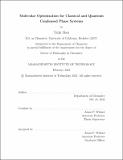| dc.contributor.advisor | Willard, Adam P. | |
| dc.contributor.author | Shen, Yizhi | |
| dc.date.accessioned | 2023-04-25T14:21:34Z | |
| dc.date.available | 2023-04-25T14:21:34Z | |
| dc.date.issued | 2023-02 | |
| dc.date.submitted | 2023-04-05T18:52:50.335Z | |
| dc.identifier.uri | https://hdl.handle.net/1721.1/150557 | |
| dc.description.abstract | Condensed phase phenomena remain a theoretical challenge to thoroughly understand and elucidate due to the close interactions among large number of microscopic degrees of freedom.
Such deviation from the non-interacting ideality necessitates an effective resolution of the constrained fluctuations and strong correlations in condensed phase systems, which can be methodically achieved using non-Euclidean optimization tools. This thesis is devoted to the optimization-based development of molecular simulations that facilitate our understanding of the static and dynamical properties of many-body systems.
Chapter 1 introduces the background on simulating condensed phase systems and sets up the overall scope of the thesis. Chapter 2 provides a primary exposure to a few fundamental connections between functional minimization on manifolds and essential properties, for example statistical and spectral, of many-body systems.
Chapter 3 considers methods adept at treating representative classical condensed-phase systems. We start with phenomenological spin models on a lattice and turn our attention to atomistic interfaces including aqueous electrolyte-electrode and polymer-protein composite. We discuss proficient schemes to implement and process our molecular simulations, allowing us to elucidate (a)typical structural-dynamical fluctuations to heterogeneities native to these classical systems.
Chapter 4 considers methods capable of studying correlated quantum condensed-phase systems. In particular, we explore the theoretical and numerical underpinnings behind non-parametric simulation schemes that utilize the error-mitigating technique of quantum subspace expansion. We focus on the emergent scenario in which the sub- space is generated by a real-time evolution implemented efficiently on quantum hardware. The practical advantages of the schemes are highlighted through demonstration of their fast and accurate extraction of spectral information. | |
| dc.publisher | Massachusetts Institute of Technology | |
| dc.rights | In Copyright - Educational Use Permitted | |
| dc.rights | Copyright MIT | |
| dc.rights.uri | http://rightsstatements.org/page/InC-EDU/1.0/ | |
| dc.title | Molecular Optimization for Classical and Quantum Condensed Phase Systems | |
| dc.type | Thesis | |
| dc.description.degree | Ph.D. | |
| dc.contributor.department | Massachusetts Institute of Technology. Department of Chemistry | |
| dc.identifier.orcid | https://orcid.org/0000-0002-4160-5482 | |
| mit.thesis.degree | Doctoral | |
| thesis.degree.name | Doctor of Philosophy | |
